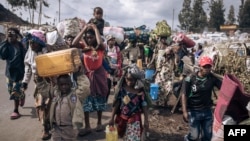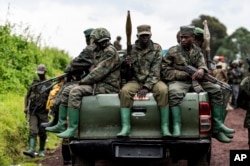An attack in the eastern North Kivu province in the Democratic Republic of Congo killed at least five people, including three women and a girl on June 19. The authorities blamed the M23 rebel group for the bombardment, Reuters reported.
Over 130 active armed groups, including M23, are fighting for control over the DRC’s natural resources, mainly gold and diamonds.
The war in DRC continues to intensify, killing at least 1,533 civilians in 14 months between January 2023 and March 2024 and displacing about 7 million people, the United Nations reported.
The escalation of on-the-ground hostilities comes amid the spread of online propaganda and disinformation engaging millions on social media.
On X, user Rybar Force continually attacks the United States with false and misleading posts, including accusations of profiteering from the ongoing war in DRC at the expense of the Congolese people. Rybar Force is a name used by Russian military blogger Mikhail Zvinchuk.
Commenting on a Bloomberg analysis that outlined the U.S.’s concerns with Russian, Chinese and Iranian growing influence in Africa, Zvinchuk wrote in an X post on June 14:
"… for the Congolese leadership the fact of seizure of North Kivu mines in favor of the US by Rwandan proxy forces represented by the M23 group has long been no secret. In this way, the U.S. authorities keep an acceptable price for the resource, preventing the country from becoming a regional leader."
That is false.
First, let’s verify Mikhail Zvinchuk’s credibility as an information source. Here are some facts:
Until 2019, Zvinchuk worked in the press service of the Russian Ministry of Defense. Before that, he served as a commander of a reconnaissance group in the Spetsnaz GRU — a special operations unit within the Russian military intelligence.
The EU and Ukraine sanctioned Zvinchuk in 2023 for distributing disinformation and pro-Kremlin propaganda and for "supporting actions that undermine and threaten the territorial integrity, sovereignty and independence of Ukraine" through his Telegram channel Rybar, which has over 1.2 million followers.
In December 2022, President Vladimir Putin appointed Zvinchuk to the Russian Presidential Council to coordinate the Russian Federation's “mobilization efforts” in support of Moscow’s war of aggression against Ukraine.
The Bell, an independent online Russian outlet, reported that between June 2020 and August 2021, Zvinchuk received funding for his Telegram channel from the late founder of PMC Wagner, Yevgeny Prigozhin. The U.S. identified and sanctioned Prigozhin for owning and funding the St. Petersburg-based Troll Factory, created to attack the U.S. with malicious disinformation and propaganda.
Second: The United States sanctioned M23 in January 2013 for committing widespread human rights abuses. The U.S. said M23 fighters have been engaged in prohibited practices such as deliberately targeting civilians, including children, and sexual violence.
The U.S. State Department condemned the Rwandan government for supporting M23 and called on it to “immediately withdraw all Rwanda Defense Force personnel from the DRC and remove its surface-to-air missile systems” in a February 17 statement.
The United States “does not in any way support M23 and has repeatedly and publicly called for the government of Rwanda to end its support to this group,” Ambassador Robert Wood, alternate U.S. representative for special political affairs in the U.N., told the U.N. Security Council briefing on the situation in the DRC this past February.
Third: Zvinchuk’s claim about the U.S. prolonging the war to control the mining and trade of the DRC’s precious metals and minerals is equally false.
The U.S. does not allow the trade of minerals sourced from conflict areas by armed groups or rights abusers into its territories.
In 2010, the U.S. Congress passed “conflict minerals” legislation commonly known as Section 1502 of the Dodd-Frank Act.
The law ensures that U.S. companies are not funding armed groups or human rights abuses.
The Dodd-Frank Act requires U.S. publicly listed companies to do "due diligence" on their supply chains of the minerals they import if they might originate from DRC to take steps to address any risks they find.
The companies are required to report their findings to the National Security Exchanges every year.
Due diligence must conform to the standards set by the Organization for Economic Cooperation and Development, which translates to the U.N. Guiding Principles of Business and Human Rights.
According to the U.S. Treasury Department, “more than 90% of DRC gold is smuggled to regional states, including Uganda and Rwanda, where it is then often refined and exported to international markets, particularly the UAE.”
On March 17, 2022, the U.S. Department of the Treasury’s Office of Foreign Assets Control sanctioned Alain Goetz of Belgium, whose company, the African Gold Refinery in Uganda, was “involved in the illicit movement of gold valued at hundreds of millions of dollars per year from the Democratic Republic of the Congo.”
Rwandan President Paul Kagame maintains the M23 rebels are fighting to defend the minority Tutsis of Rwandan origin who live in Congo.
M23 is made up primarily of ethnic Tutsis. Formerly part of the Congolese army, the group was named after the March 23, 2009, peace treaty with the DRC government.
In 2012, M23 took control of Goma in DRC's North Kivu province, which borders Rwanda, claiming the peace deal was poorly implemented. The DRC army and U.N. peacekeepers defeated M23, with its surviving combatants fleeing to Rwanda and Uganda.
M23 remained dormant for the next decade but reemerged in November 2021 and took control of most of eastern DRC.







